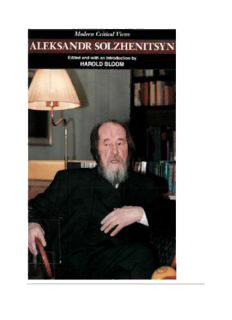
Aleksandr Solzhenitsyn (Bloom's Modern Critical Views) PDF
Preview Aleksandr Solzhenitsyn (Bloom's Modern Critical Views)
Modern Critical Views ALEKSANDR SOLZHENITSYN Edited and with an introduction by Harold Bloom Sterling Professor of the Humanities Yale University ©2001 ISBN:0791059189 Contents Editor'sNotevii Introduction1HaroldBloom HumanityInExtremis:OneDayintheLifeofIvanDenisovichandTheLove-GirlandtheInnocent3EdwardE. EricsonJr. Solzhenitsyn'sTraditionalImagination:Tolstoy13JamesM.Curtis PrussianNights:APoeticParableforOurTime73KennethN.Brostrom TheGulagArchipelago:AlternativetoIdeology85JohnB.Dunlop TheCalfandtheOak:DichtungandWahrheit95EdwardJ.Brown Solzhenitsyn:TheRussianLiberal113MikhailS.Bernstam Solzhenitsyn,theCreativeArtist,andtheTotalitarianState127Q.D.Leavis HumanRightsandLiterature:SolzhenitsynandPasternak151AnnaDiegel TheWorldofDetentioninDostoevskyandSolzhenitsyn161SophieOllivier TheWordofAleksandrSolzhenitsyn171CarylEmerson TheSolzhenitsynThatNobodyKnows183HughRagsdale TheSubtextofChristianAsceticismin OneDayintheLifeofIvanDenisovich189SvitlanaKobets Chronology205 Contributors211 Bibliography213 Acknowledgments215 Index217 Editor's Note MyIntroductionwonderswhetherSolzehenitsyn'simportancemayprovetobemorehistoricalthanaesthetic,and questionsalsowhetherhehasbeenabletotranscendTolstoy'sinfluenceuponhim. ThechronologicalsequenceofcriticismbeginswithEdmundE.EricsonJr.'sconsiderationoftheshortnovel One DayintheLifeofIvanDenisovich,whichisseenasatributetohumanity'sendurance. Inaverychallengingessay,JamesM.CurtisanalyzesSolzhenitsyn'scomplexrelationtohisgreatprecursor, Tolstoy,afterwhichKennethN.BrostromfindsinthepoemPrussianNightsSolzhenitsyn'sinsistencethatmorality residesinouractions,andnotinourfeelings. TheGulagArchipelagoisregardedbyJohnB.Dunlopasa"positive"statement,despitethehorrorsitdepicts, becauseitrepresentsatriumphoverideology. EdwardJ.BrownexaminesSolzhenitsyn'spolemicalliterarysatireTheCalfandtheOak,findinginitacrucial documentofRussianculturalhistory,whileMikhailS.BernstamseesSolzhenitsynasanoriginalLiberalwithout precedentinRussiantradition,andthereforedoomedtobemisunderstoodbothinRussiaandtheWest. Q.D.LeavisdefendsSolzhenitsynbothasaliterarystylist,andasanadvocateofindividualrights,afterwhich AnnaDiegelcomparesPasternakandSolzhenitsynassuchadvocates. DostoevskyiscontrastedtoSolzhenitsyn,asnovelisticvisonariesofdetentionbythestate,inSophieOllivier's essay,whileCarylEmersonviewsSolzhenitsynasaprophetwhoseWordwarnsusagainstthe"relentlesscultof novelty." HughRagsdaleemphasizeswhatisstillSolzhenitsyn'spoliticaldilemma:howtopreservethefolkethosofRussian culturewhilethenationrecoilsfromSovietMarxismtowardsWesterncapitalism. Inthisvolume'sfinalessay,SvitlanaKobetsfindsahiddenpatternofChristianasceticisminOneDayintheLifeof IvanDenisovich,theTolstoyantalethatmarkedSolzhenitsyn'strueinception. Introduction SolzhenitsynisacentralfigureintheGreatRussiannarrativetraditionwhosetitansincludeTolstoy,Dostoevsky, andLeskov,allofwhomwerecrucialinfluencesuponSolzhenitsyn'sownfiction.Tolstoy,thelargestofthese presencesinSolzhenitsyn,seemstohavehadasprofoundaneffectuponthelaterwriter'slifeasuponthework.The heroicstanceagainstacorruptandbrutalgovernment,thepatrioticRussianreaffirmationoftheOldBelieverFaith: thesepassedfromTolstoytoSolzhenitsyn.CountTolstoy,aristocratandheresiarch,wasuntouchablebytheawed Czaristregime.Solzhenitsyn,anuncommoncommoner,servedintheGulagdespitehisheroisminbattle,and finallywassentintoexilebyaperplexedandfrightenedPolitboro.ReturningfromhisNewEnglandexilewhen Communismfell,theagingSolzhenitsynat81isscarcelyathomeinthequasi-democraticRussiaofPutin,whereas writerheisallbuttotallyisolated.Tolstoy,inhisdarkestmoments,wassupportedbythousandsofTolstoyans, literaryandreligious,butSolzhenitsynseemstohavelivedbeyondhistime.Asaprophetcryingoutagainstmoral depravityinhisbelovedRussia,heisignored,ordismissedasarelic.Jeremiah-like,hedenouncesRussianyielding toWesternconsumerism,buttheconsumersarenotmoved.HecameoutneitherfornoragainstYeltsinandPutin, butdeclaredagainforJesus,theRussianJesusofTolstoyand(withmanydifferences)ofDostoevsky. ItisdifficulttojudgeSolzhenitsyn'smajorworks—August1914,CancerWard,TheFirstCircle,TheGulag Archipelago,OneDayintheLifeofIvanDenisovich—apartfromtheircontext,hismagnificentstruggleagainstthe Stalinistlegacy.ThejudgmentofhisyoungerRussiancontemporariesisthatallthesearenow,atbest,admirable PeriodPieces.Willthatnowfashionablejudgmentprevail? Clearly,thereisnoWarandPeacenorAnnaKarennina,noTheBrothersKaramazovnorCrimeandPunishment, amongSolzhenitsyn'snarratives.Are wetosaythatheisdoomedtoberememberedonlyinthecategoryofthewriter-as-witness,amuchlargerversionof thesincerebutlimitedElieWiesel?IfonelooksforhisAmericanequivalent,onefindsnotFaulknernoreven HemingwaybutJohnDosPassos,agrandcameraeye,orevenSteinbeck,whoseTheGrapesofWrathseemsnot unworthyofSolzhenitsyn'spopulistreligiosity. WedoSolzhenitsyn'snovelsakindofviolencebyattemptingtoreadthemapartfromtheircentral,historical positionaspolemicaltestimoniesagainstStalinandhisheirs.Yetitistheyear2001.Dothesebookssustain themselvesaestheticallybytheirowninternalstrength?CanwereadTheFirstCircleaswereadTheCharterhouse ofParmaandTheMagicMountain,asanothergreatinstanceoftheclassicEuropeannovel? Theanswerseemstomeatouchmixed:yesandno,noandyes.TheFirstCirclederivesfromWarandPeace,a dangerousoriginforanynovelwhatsoever,andalsofromTolstoy'sgreatshortnovel, HadjiMurad.Severalcritics havenotedtheclearrelationbetweenCzarNicholasIinHadjiMuradandStalininTheFirstCircle;bothrulersare accuratelyportrayedasviciousegomaniacs.ButagenerallyTolstoyanatmospherepervadesallofTheFirstCircle, andbecomesdisconcerting.Solzhenitsyntendstobealaconicwriter,morelikeHemingway(whomhehadread closely)thanlikeTolstoy.ApersistentTolstoyanismdemandsTolstoy'sownpowertofreshlyre-perceivenatural reality,asthoughhewereanewHomer.Solzhenitsynisawriterofawhollydifferentorder,drivenbyangerand heroicendurancebutlackingTolstoy'ssuperblynaturalgrace. FictionwritersofthecenturynowendinginRussiahaveincludedIsaacBabel,permanentlymemorableforhisshort stories,andMikhailBulgakov,whosefantasy-novelTheMasterandMargaritaisanastonishment.Solzhenitsyn doesnotprovidethepurepleasureofreadingtheydo,atleastforme.Andhemaynothavetheabsoluteaesthetic eminenceofthegreatmodernRussianpoets:AlexanderBlok,AnnaAkhmatova,OsipMandelstam,Marina Tsvetayeva.YetSolzhenitsyn,whocannotbesaidtohavetriumphedinhisaestheticagonwithTolstoy(butthen, whocould?),hasaneminenceintimesostrongthatitmayprevailovertime.Hislifeandhisworkalikeare exemplary,andscarcelycanbedistinguished,onefromtheother. EDWARDE.ERICSONJR. Humanity In Extremis: One Day in the Life of Ivan Denisovich and The Love-Girl and the Innocent The short novel One Day in the Life of Ivan Denisovich is a very importantwork,bothforSolzhenitsyn's artisticreputationandfortheunfoldingstoryofhiscareer.TheplayTheLove-GirlandtheInnocentisconsiderably lessimportantonbothscores.Whatlinksthemtogetheristheirsettinginsimilar(notidentical)hard-laborprison camps;theyreflectonthesamegeneralperiodandexperiencesofSolzhenitsyn'slife.Bothwerecomposedshortly aftertheauthor'sreleaseintofreedom. ThestoryofthepublicationofOneDayintheLifeofIvanDenisovichisoneoftheexcitingliterarystoriesofour time.When,in1961,SolzhenitsynhopedthattheSovietculturalclimatemightpossiblyhavethawedenoughto allowhisnoveltobepublished,hesoughttogetitthroughtoAlexanderTvardovsky,editorofNovyMir.His middlemanwasLevKopelev(thereal-lifemodelforthecharacterLevRubininTheFirstCircle.)Solzhenitsyn knewthatheriskedhislifeinseekingtobepublished.HeknewalsothatifanySovietperiodicalwouldpublishhis story,NovyMirwouldbetheone.Tvardovskystuffedthisworkbyatotalunknownintohisbriefcaseandtookit home;and,aswashiswont,heproppedhimselfupcomfortablyinhisbedtopagethroughnewlyreceived manuscripts.HeopenedOneDay.Theworkimmediatelyoverwhelmedhim:"Irealizedatoncethattherewas something (FromSolzhenitsyn:TheMoralVisionbyEdwardE.EricsonJr.©1980byWm.B.EerdmansPublishingCo.) important,andthatinsomewayImustcelebratetheevent.Igotoutofbed,gotfullydressedagaininevery particular,andsatdownatmydesk.ThatnightIreadanewclassicofRussianliterature." Anticipatingtheknee-jerkresponseoftheSovietliteraryestablishmenttothissearingindictmentofStalin'sprison camps,Tvardovsky,thesupremeliterarydiplomat,usinghispowerfulpositionandconnections,wentrighttothe topandsoughtfromNikitaKhrushchevpermissiontopublishthenovel.Khrushchevapparentlydecidedthatthis novelwouldhelphimconsolidatehisbaseofpower,whichhewasbuildingpartlyonadenunciationofStalin's corruptionoftotalcontrol.Khrushchev'sfellowmembersofthePolitburofeltthattheyhadlittlechoicebuttoallow NovyMirtopublishthecontroversialnovel. ItappearedintheNovember1962issue,inanoverrunof95,000whichsoldoutimmediately.Aseparaterunof nearlyamillioncopiesalsosoldoutquickly.Anunknownsmall-townteacherwas,atonestroke,onthecenterstage ofRussianliterature.Thewholeworldtooknote.Forhis"liberalism"Khrushchevwaspraisedwidely. Earlyreviews,eveninthemostorthodoxofSovietsources,wereoverwhelminglyfavorable.Pravdaremarkedon Solzhenitsyn's"profoundhumanity,becausepeopleremainedpeopleeveninanatmosphereofmockery."Zhores Medvedev,whowaslatertowriteTenYearsafterIvanDenisovich,emphasizedtheartistryofthenovel.Butmost responses,inkeepingwithKhrushchev'smotivationforallowingpublication,centeredonthebook'spolitical significance.Importantly,mostWesternreviewsalsoemphasizedthepoliticaldimension;thebook'spublication wasviewedasaneventillustratingtheincreasingthawwithintheSovietUnion,thusauguringwellforfutureEast- Westrelations.SofromthebeginningSolzhenitsyn'sworkwasviewedthroughthewronglens. ApoliticalapproachdoesnotpenetratetotheheartofOneDay.Thenovelisnot,initsessence,aboutStalin's inhumanitytoman;itisaboutman'sinhumanitytoman.Stalinisnotsomeaberrationinanotherwisesmooth progressionofhumanenessinhistory.Theevilofthehumanheartisauniversaltheme:thisisSolzhenitsyn's approach. Perhapsneverhasthepoliticalappropriationofaworkofartbystateauthoritiesbackfiredsodramaticallyand totallyasinthecaseofOneDay.Oncehavingbeencatapultedintothelimelightofworldattention,Solzhenitsyn wouldnotbesilent.Nowhehadaplatform,andhissenseofdutyurgedhimon.Khrushchevhadletoutofthebottle ageniewhichhissuccessorscouldnotputbackin.ThehighvisibilityaffordedbyKhrushchev'sdecisionprovided Solzhenitsynwithalltheprotectionofworldopinionwhichheneededinordertoescapethebrutalitieswhich almost certainlywouldotherwisehavebeenvisiteduponhimforsayingwhathewentontosay. Despitethefactthatsomecriticsconsider OneDayintheLifeofIvanDenisovichthebestpieceSolzhenitsynever haswritten,heseemstohavefeltthathewasstillatakindofapprenticeshipstage.Hehadalreadylaidplansfor muchlargernovels;firsthehadtoperfecthiscraftbyworkinginunitsofsmallerscope. OneDayneverthelesshasmanytraitsincommonwithoneormoreofthelongernovels.Ofcourse,itkeepsitseye onthoseuniversalissuesofhumansuffering,ofgoodandevil,oflifeanddeath.LikeTheFirstCircleandCancer Ward,itisbasedonpersonsandeventswhichSolzhenitsynexperiencedandobservedinhisownlife.Ithas Solzhenitsyn'scharacteristicallytightsettingintime—onedayinthiscase.Ithasalargenumberofcharacters, givingussomethinglikeacrosssectionofSovietsociety—anotherSolzhenitsyntrait. IfOneDaywaspartofaperiodofapprenticeship,itstandsneartheendofthatperiod.Theauthorwasaboutto embarkonthoselongnovelsofhismaturity.Andthisnovelisapieceofsuchconsummateartistrythattocallitthe workofanapprenticeseemsultimatelyinadequate.HadSolzhenitsynwrittennothingafterOneDay,hisreputation asanauthorofnotewouldhavebeensecure.Withthisshortnovelhehadarrived,whateverhisfurtherambitions. HisliterarysituationatthisstageisinterestinglyparalleltothatofMilton:hadMiltonwrittennothingafter "Lycidas,"hewouldstillbeananthologizedpoet;buthewentontoParadiseLost,ParadiseRegained,andSamson Agonistes. Thenoveldepictsasingledayinthelifeofasimplepeasant,IvanDenisovichShukhov,whohasbeenunjustly thrownintoaprisoncamp.Whileweseemanyofhisfellowzeks,thefocusremainsrathertightlyfixedonShukhov. Itisadayinwhichnotmuch,certainlynothingmomentous,happens.Thezekseattheirpitifullyinadequategruel, workhardasbricklayersandfoundrymen(Solzhenitsynhimselfworkedasboth),arecountedandrecounted,and finallyretire—toprepareforanotherday,andotherdays,ofthesame. Solzhenitsynshowsgreatrespectforhistitlecharacter.Shukhovisnotatallanauthorialalterego,asareOleg KostoglotovinCancerWard(somewhat)andGlebNerzhininTheFirstCircle(considerably).Theclearestsignof respectisinthemerenamingofthehero.Thecombinationofgivenname(Ivan—significantly,themostcommonof Russiannames)andpatronymic(Denisovich—sonofDenis)isapoliteformmostreadilyusedforpersonsofhigh stationorintrinsicimportance.Solzhenitsynappliesittoa simplepeasant.Theauthordeemshischaracterworthyoftherespectusuallyreservedfor"important"people. ThemostmemorabletechnicaltraitofOneDayisitsunderstatement.Thenoveldepictshorrorswhichmightwell elicitwhite-hotanger—or,ifnotthat,akindofsentimentalityoverthesufferingofinnocents.Thennovelmakesno suchexplicitclaimonouremotions.Rather,itdescribesthedayofShukhovandhisfellowsasnottoobad,as almostagoodday.Thefinalpassageofthenovel,cappedbyabrilliantlyconceivedfinalsentence,highlightsthe deviceofunderstatement: Shukhovwenttosleep,andhewasveryhappy.He'dhadalotoflucktoday.Theyhadn'tputhiminthecooler.The ganghadn'tbeenchasedouttoworkintheSocialistCommunityDevelopment.He'dfinagledanextrabowlofmush atnoon.Thebosshadgottenthemgoodratesfortheirwork.He'dfeltgoodmakingthatwall.Theyhadn'tfounda pieceofsteelinthefrisk.Caesarhadpaidhimoffintheevening.He'dboughtsometobacco.Andhe'dgottenover thatsickness. Nothinghadspoiledthedayandithadbeenalmosthappy. Therewerethreethousandsixhundredandfifty-threedayslikethisinhissentence,fromreveilletolightsout. Theextraoneswerebecauseoftheleapyears.... Thisconcludingpassagealsoallowsustocheckontheimportanttechnicalmatterofnarrativepointofview.Itisa matterhandleddelicatelybutconsistentlyinthisnovel.Theauthorisalwaystellingthestory;Shukhovisalwaysin thethirdperson.Yet,byacleversleightofhand,theauthorkeepsmakinghisreadersfeelasiftheyareinsidethe mindofthemaincharacter;truly,IvanDenisovichistheonewhothinksthatthisisnottheworstofdays.Readers areleftwiththeimpressionthattheyseeandexperienceShukhov'sdaythroughhisowneyes,thoughintechnical facttheyneverdo.Inthis,Solzhenitsynhasshownconsiderableskillasafictionwriter. AsistypicalofSolzhenitsyn'sworks,OneDayshowsussufferinghumanityinextremis.ButbecauseofShukhov's limitedperspective,sufferinghereisdepictedasprimarilyphysical.InTheFirstCirclethemoresophisticatedGleb Nerzhinshowsthatsufferingisalsopsychologicalandevenspiritual.Yetbothofthesenovels—incontrastwith CancerWard,whichdealswiththemysteryofsuffering—treatasufferingtheperpetratorofwhichisnomysteryat all.Still,eveninOneDaythesufferingofthebodytakesonametaphysicaldimension—throughthemediationof theauthor,whocangobeyondthekenofthemaincharacter.Theinhospitablycoldclimate becomesasymboloftheinhumanesettingforhumanlifeingeneral,andthereadercomesawayfeelingmoral outrageratherthanmerevicariousphysicalpain.WhenamedicalassistantfindsthefeverishIvannotillenoughto exemptfromtheday'swork,theauthorqueries,"Howcanyouexpectamanwho'swarmtounderstandamanwho's cold?"Itisoneofthosemicrocosmicremarksfromwhichrayoutlargesymbolicmeanings.Thewarmmanisthe oneopentoperpetratinginjustice.Solzhenitsyndevoteshislifetomakingwarmmenfeelthecold. Anysuch"big"thoughtsareasfarbeyondShukhovastheyarebeyondtheprisonguards.Shukhov,nowyearning afterahandfulofoatsthatoncehewouldhavefedonlytohishorses,thinks,ashegetshispittanceoffoodforthe day,"Thiswaswhataprisonerlivedfor,thisonelittlemoment."Butevenherethestomachischeatedandthesoul, thereby,troubled.Andwhatdotheseguardsofthe"animals"care?"Everyrationwasshort.Theonlyquestion was—byhowmuch?Soyoucheckedeverydaytosetyourmindatrest,hopingyouhadn'tbeentoobadlytreated." Thearbitrarinessofthelifeofthezeksisall-governing.Theguardsarenotallowedtorecognizethediversityand unpredictabilityoflife;onlytwozeksmaybesickperday;onlytwolettersperzekmaybemailedoutperyear. "Sovietpower,"Solzhenitsynsatirizes,hasdecreedthatthesunstandshighestintheskynotatnoonbutanhour later.Beingdehumanizedentailsbeingdenatured. GiventhecollectivistideologyoftheSoviets,anironiceffectoftheirprisonregimenisthatitbreaksdownthesense ofhumansolidarity.Solzhenitsyn,whospeaksconsistendyonbehalfofindividualdignity,alwaysspeakswithequal consistencyonbehalfofhumansolidarity.Sohelamentsthatinazek'sminditisanotherzekwhoisone'sworst enemy.Occasionaldisplaysofsolidarity,whichshouldbeanaturaloutflowingofthezeks'commonhumanityand theirsharedplight,usuallysuccumbtothecampattitude,"YoucroaktodaybutImeantolivetilltomorrow." Nevertheless,howevermuchthegrimenvironmentandtheneedtoadaptsomehowtoitmayreducethebasic humanityofthezeks,suchpressurescannevereradicatethehumanessence.Tobesure,Shukhovisconstantlyand instinctivelyconcernedwithself-preservation.Whenhewasaccused,absurdly,ofhightreasonforsurrenderingto theGermanswiththeintentionofbetrayinghiscountry,hecoollycalculated:"Ifhedidn'tsign,hewasasgoodas buried.Butifhedid,he'dstillgoonlivingawhile.Sohesigned."Butthereismore.Amanwillasserthiswantsas wellashisneeds.Forinstance,hewantstosmoke;itisanunnecessarysmallpleasure,buthewillfindaway.Then, thereissatisfactioninwork.Ivanworkspoorlyonlywhengivenmeaninglesstasks.Layingbrickswellpleaseshim, evenifin prison.Constructiveworkbringsoutinhimtheennoblingqualityofself-validationthroughcreativeeffort.And whattrulyhumanbeingcanremainforeversilentwhenheistreatedasmerefleshandbones?When,onthewayto work,Ivanisfriskedbythecampguards,hethinks,"Comeon,pawmeashardasyoulike.Thereisnothingbutmy soulinmychest."Thecampsystemwouldgranthimthestatusonlyofananimal,aworkhorse.Itisuptohimto insist,howeverinaccurately,thatheismorethanthat,thatheisspiritual,too,andnotonlymaterial. ThegreatestofallhumancapacitiesdemonstratedbyIvanDenisovichishiscapacitytoabsorbpainandyetto endurewithatleastsomevestigesofhumanityintact.ThisenduringhumanityisoneofSolzhenitsyn'smost importantthemes,anditishisgreatconsolationasheweepsformankind.Thebesteffortstoreducehumanitytothe leveloftheanimalareneverentirelysuccessful;and,bydefinition,aprocessofdehumanizationwhichisnottotally successfulisafailure:somehumanityremains."There'snothingyoucan'tdotoaman..."—exceptthatyoucannot doawaywithhishumanityaltogether.Longsuffering,Solzhenitsynthinks,isapeculiarlystrongtraitoftheRussian peasantry.Thepeasantmaybepatient,butheisalsodurable;andultimatelyhewillovercome. IvanDenisovich'sattitudetowardreligionismuchlikeMatryona'sin"Matryona'sHouse."Bothshowlittleinterest informalreligion,eitherecclesiasticalorcredal.Yetbothbreatheakindofnaturalpiety,andreligiousreferences peppertheireverydaytalk.Ivan'sreadyresponsetohistribulationsinprisonis,"Aslongasyou'reinthebarracks— praisetheLordandsittight."Atday'send,gratefulthatheisnotinthecellsandthinkingthatitisnot"sobad sleepinghere,"hemurmurs,"ThankGod."Whenheforgetsuntilthelastmomentbeforeheisfriskedthathehasa hacksawbladeonhim,healmostinvoluntarilypraysas"hardashecould":"GodinHeaven,helpmeandkeepme outofthecan!"Afterwards,however,thisdown-to-earthpeasant"didn'tsayaprayerofthanksbecausetherewasn't anytimeandtherewasnosenseinitnow." Ivan'sfaithisnaiveandunreasoned,andincludesasizeabledoseofsuperstition.HebelievesinGod:"WhenHe thundersupthereinthesky,howcanyouhelpbelieveinHim?"Healsobelieves,asfolkinhisvillagedo,thateach monthGodmakesanewmoon,becauseheneedstheoldonetocrumbleupintostars:"Thestarskeepfallingdown, soyou'vegottohavenewonesintheirplace."Atheisticrulersmaycurtailthegrowthofreligion("TheRussians didn'tevenrememberwhichhandyoucrossyourselfwith"),butitisbeyondtheirpowertoshakethefaithofthe MatryonasandIvans. WhileSolzhenitsynclearlyadmiresIvan'sfaith,Ivandoesnot representhisreligiousideal.AcharacterwhocomesclosertodoingsoisAlyosha(orAlyoshka)theBaptist.Itis intriguingthatSolzhenitsyn,whohasreturnedtohisancestralRussianOrthodoxChurch,givesthedeepestreligious sentimentsinthisnoveltoacharacterwhoishostiletoOrthodoxy.Thisdepictionisofapiecewiththenovel'shigh praiseoftwoEstonianzeks—andthisfromanauthorsometimescalledchauvinisticandnationalistic.Thefactis thattheauthorissimplybeingfaithfultothequalityofthepersonswhomheknewinthecamps.Inaddition, Solzhenitsyn'shandlingofAlyoshashowsthathisprimaryreligiousconcernsarenotwiththeparticularitiesof OrthodoxybutwiththosecentralaspectsoftheChristianfaithheldincommonbyallChristians. TheclimacticconversationofthenovelisbetweenIvanandAlyosha.Alyosha'sprominenceherehasbeenprepared forbyfrequentearlierdepictionsofhimasagoodworkerandkindperson.Alyosha'sfaithdoesnotincapacitatehim forsurvival.Onthecontrary,itisasourceoftheinnerstrengththatsooftencharacterizesSolzhenitsyn'slittle heroes,thesmallpeoplewhosomehowareabletowithstandeverythingthatasoullessbureaucracyinflictsonthem. Whileheallowsanyonetoorderhimabout,heisstillcleverenoughtohavehiddenhisNewTestamentinachinkin thewallsothatithassurvivedeverysearch.TheregularSundayfellowshipofAlyoshaandhisfellowBaptists allowsthemtocopewiththehardshipsofcamplife"likewateroffaduck'sback."Heissustainedbybiblical passagesofconsolation:"YetifanymansufferasaChristian,lethimnotbeashamed;butlethimglorifyGodon thisbehalf." TheclimacticconversationbeginswhenAlyosha,readinghisBible,overhearsIvan'sroutine,day'sendprayerand says,"Lookhere,IvanDenisovich,yoursoulwantstopraytoGod,sowhydon'tyouletithaveitsway?"Ivan,the naiveOrthodox,associatesthisBaptistwithhighdevotionandthinksthatAlyosha'seyesglowed"liketwocandles." ButIvan,forwhomcampexperienceisamicrocosmofalloflife,doubtstheefficacyofpraying:"...allthese prayersarelikethecomplaintswesendintothehigher-ups—eithertheydon'tgetthereortheycomebacktoyou marked'Rejected.'"AlyoshkascoldsIvanfornotpraying"hardenough,"andadds,"ifyouhavefaithandtellthe mountaintomove,itwillmove."Thisboldconfidenceistoomuchforliteral-mindedIvan,whohasneverseena mountainmove(thoughhethenallowsthathehasneverseenamountainatall!).Forhispart,Ivan,unlikethose zekswhohavelosttheircapacityforcompassion,pitiestheBaptistsas"poorfellows":Theywereinnoone'sway, and"alltheydidwaspraytoGod";yet"theyallgottwenty-fiveyears...."Onthequestionofmountain-moving, Alyoshaassertsthesupremacyofthespiritualrealmoverthematerial,sinceofallphysicalthings,theLord commanded themtoprayonlyfortheirdailybread;beyondthat,"Wemustprayaboutthingsofthespirit—thattheLordJesus shouldremovethescumofangerfromourhearts...." Ivandoesnotwanttobemisunderstood.Althoughdisillusionedbyabadpriest,heinsiststhathebelievesinGod. "ButwhatIdon'tbelieveinisHeavenandHell."Theafterlife,afterall,isnotopentoempiricalverification,asare monthlynewmoonsandfallingstars.Whenheprays,hesays,itwillbeforsomethingreal,likereleasefromprison. ThisattitudescandalizesAlyosha,whoconsciouslysuffersforChrist.Hecounters,"Whatdoyouwantyour freedomfor?Whatfaithyouhaveleftwillbechokedinthorns.Rejoicethatyouareinprison.Hereyoucanthinkof yoursoul."Thisspiritualfocus,whichSolzhenitsynelsewhereassertsinhisownperson,affectsIvan:"Alyoshawas talkingthetruth.Youcouldtellbyhisvoiceandhiseyeshewasgladtobeinprison." SolzhenitsynadmirestheBaptist'sabilitytogiveapositivemeaningtohisprisonexperience;Alyoshaistheonly characterinthenovelwhocandoso.Ivanadmiresthat,too.Butitjustwillnotdoforhim."ItwasChristtoldyouto comehere,andyouareherebecauseofHim.ButwhyamIhere?Becausetheydidn'tgetreadyforthewarlikethey should'veinforty-one?Wasthatmyfault?" AlthoughhecannotbelieveeverythingAlyoshacan,Ivan'sactionsareasgoodasanyone's.ConsideringAlyosha impractical,alwaysgivingandnevergetting,Ivangiveshimabiscuit,thoughthatgestureleavesthegiverwith nothingforhimself.Solzhenitsyncomments,"We'venothingbutwealwaysfindawaytomakesomethingextra." Ivangivesthecupofcoldwater,thoughnotalwaysknowinglyinGod'sname.IfAlyoshahasthebestwords,noone hasbetterdeedsthanIvan. IvanandAlyoshaarebrothersundertheskin.Botharemodelsofhumanityinthemidstofinhumanity;bothcarefor othersasmuchasforthemselves.Ivanrepresentsthebestpossiblefromamanwithoutanarticulatedfaith;aman canactverywellwithoutfaithinatranscendentreality.Suchaoneisinnoposition,however,toexplainthe mysteryofsuffering.Thiscrucialmatter,whichIvandeeplyneeds,iswhatAlyoshacanadd.WithoutAlyosha,the novelwouldbemuchdiminished.Ivan,asgoodasheis,needsAlyosha'sinsighttocompletethepicture. TheLove-GirlandtheInnocentisoneofSolzhenitsyn'stwopublishedplays,neitherofwhichranksamonghistop literarysuccesses.Inthiscase,thelargecastofcharactersinabriefworkisespeciallyproblematical(fifty-seven individuals,plusothersingroups—inaplayof133pages).ItshareswithOneDayintheLifeofIvanDenisovichthe settingofaprisoncamp,thoughthistimeamixedcampof"politicals"andthieves.Italsosharesthe themesofsuffering,injustice,anddehumanization.Campland,that"invisiblecountry,"istheplace"whereninety- ninemenweepwhileonemanlaughs." Thetwomemorablecharactersarethetitlecharacters:LyubaXyegnevitskaya,thelove-girl,andRodionNemov,the newlyarrivedinnocent.Herviewisthatallmenare"onlyafteronething."Sosheadapts.She,aso-calledkulak fromaland-owningfamily,hadbeenmarriedoffatfourteenyearsofage.Nemov,nottheadapterLyubais,feels "sorryforeveryone"inthecruelcampsetting.HecarrieswithinhimthestapleSolzhenitsynconvictionthat conscienceismoreimportantandvaluablethanlifeitself.Formerlyacavalrycaptain,Nemovuponhisarrivalthere isnamedproductionchiefofthecamp.Butquicklytheprofessionalthieves,whomStalinconsidered"socialallies," persuadethecampcommandanttogetridofthiscircumspectmanandtoreplacehimwithamanoftheirownilk, theengineerKhomich.Lyuba,despitehercompromises,hasenoughinsighttoknowagoodmanwhensheseesone, andshefeelssorryforNemov;sherecognizesthatheisnotcamp-wise. AfterNemovisdemotedtofoundryman,heandLyubadiscoverastrongmutualattraction.Theyliveforaweekina courtship-likearrangement.Butthecampdoctor,Mereshchun,wantsLyubaforhislive-in"campwife."Nowin lovewithNemov,shesuggeststhatheandthedoctorshareher;shecanmanagethatmuch.ButtheidealisticNemov cannottoleratesuchanarrangement. Shortlythereafter,Nemovisstruckontheheadbyafallinglumpofcoal.Firstwordisthatheisdead,butitturns outthatheisnot.ThefinalsceneshowsLyubareturningtothedoctor'scabin,sadbutreconciledtoherdemeaning fate. Thisdrama,especiallygivenSolzhenitsyn'selaboratestagedirections,wouldprobablybebetterintheplayingthan inthereading.Thebackground,picturingStalinandflowersandchildren,aswellasposters("Workennoblesman," "Hewhodoesnotworkdoesnoteat,"andlater"Peoplearethemostvaluablecapital—J.Stalin"),providesa strikingcontrastwiththeforegroundanditsunmitigatedmiseryandinjustice. TheLove-GirlandtheInnocentshowsasclearly,ifnotsoeffectively,asOneDayintheLifeofIvanDenisovichthe dehumanizationoftheSovietcamps.LittleofSolzhenitsyn'sreligiousoutlookcomesthroughinthisplay,although hismoralvisionremainsconstant.Inthatlight,thisplaycouldbeseenasthemostdirectlyanti-Stalinist,oranti- Soviet,ofallSolzhenitsyn'sfull-lengthworks—theothersalwaysrisingratherclearlytomoreuniversalthemes. Still,thedualvisionofhumannature,withgoodandevilwarringineachhumanheart,remainsprominent.The struggleisseenmoresharplyinLyubathaninanyothercharacter. Itispossibletoreadthisplayallegorically,thoughcaremustbeexercisedhere,sinceSolzhenitsyn'swritings generallydonotinvitesuchaninterpretation.YetitiseasyenoughtoseeLyubaasMotherRussia,whosubmits unhappilytothedemeaningyokeofservitude;repressingherbestmoralinstincts,sheturnsherback,regretfully,on thehighbuthardway—toprivatefreedomwithinpublicbondage—offeredbytheexampleofNemov. JAMESM.CURTIS
Description: